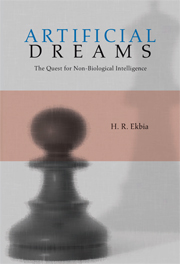Book contents
- Frontmatter
- Contents
- List of Figures and Tables
- Preface
- Prologue
- 1 GPS: The Origins of AI
- 2 Deep Blue: Supercomputing AI
- 3 Cyborgs: Cybernetic AI
- 4 Cyc: Knowledge-Intensive AI
- 5 Coach and Chef: Case-Based AI
- 6 Language Learning: Connectionist AI
- 7 Mathematical Models: Dynamical AI
- 8 Cog: Neorobotic AI
- 9 Copycat: Analogical AI
- Epilogue
- Appendix A Minimax and Alpha-Beta Pruning
- Appendix B An Introduction to Connectionism
- Appendix C The Language Acquisition Debate
- Notes
- Bibliography
- Author Index
- Subject Index
Prologue
Published online by Cambridge University Press: 05 June 2012
- Frontmatter
- Contents
- List of Figures and Tables
- Preface
- Prologue
- 1 GPS: The Origins of AI
- 2 Deep Blue: Supercomputing AI
- 3 Cyborgs: Cybernetic AI
- 4 Cyc: Knowledge-Intensive AI
- 5 Coach and Chef: Case-Based AI
- 6 Language Learning: Connectionist AI
- 7 Mathematical Models: Dynamical AI
- 8 Cog: Neorobotic AI
- 9 Copycat: Analogical AI
- Epilogue
- Appendix A Minimax and Alpha-Beta Pruning
- Appendix B An Introduction to Connectionism
- Appendix C The Language Acquisition Debate
- Notes
- Bibliography
- Author Index
- Subject Index
Summary
Cognition is a complex, multifaceted, and multilevel phenomenon. Unraveling it, therefore, is beyond the scope of any single discipline, the capacity of any one method, or the resources of any individual philosophy. Rather, it can emerge from the exchanges and interactions among multiple ideas, methods, models, and philosophies. In our times, cognitive science has nominally taken on the challenge to bring these strands together but, as any cognitive scientist would be willing to acknowledge, the challenge cannot be effectively met without the serious and engaged contribution of neighboring disciplines. Artificial Intelligence (AI) is one such neighbor to cognitive science, but it seems that in recent years the exchange between them has not been as active and extensive as it could be. One reason for this, I believe, is the history of developments in AI and the overall image that this history has created of the field in the scientific community. The main purpose of the current study is to examine and explain this history, not to merely criticize AI, but also to highlight its contributions to science, in general, and to cognitive science, in particular. Interestingly, these contributions are both direct and indirect. That is, there are lessons to be learned from both the content of AI – its approaches, models, and techniques – as well as from its development. We can learn from AI by learning about it.
- Type
- Chapter
- Information
- Artificial DreamsThe Quest for Non-Biological Intelligence, pp. 1 - 20Publisher: Cambridge University PressPrint publication year: 2008



